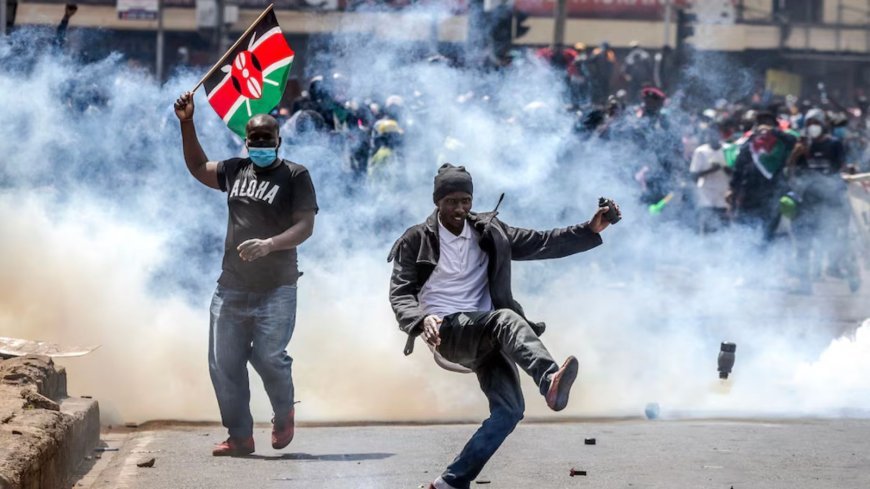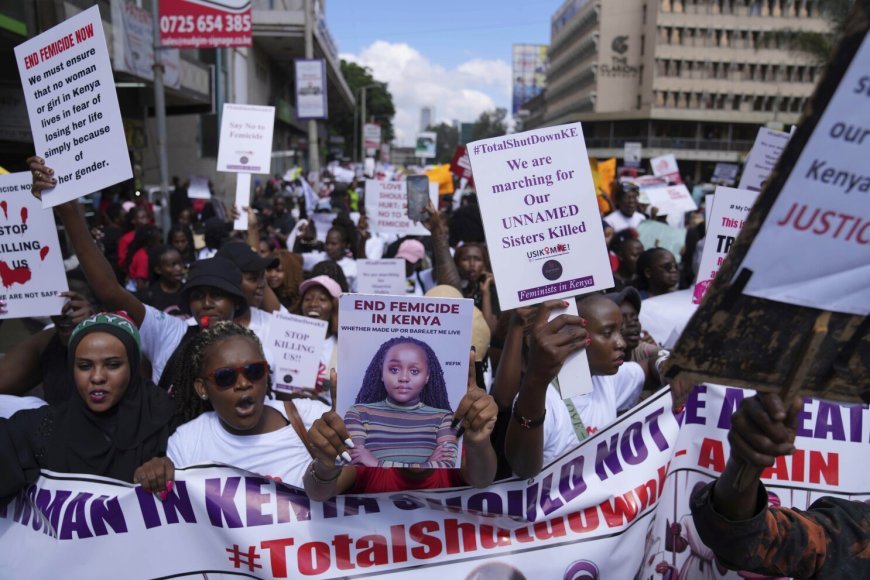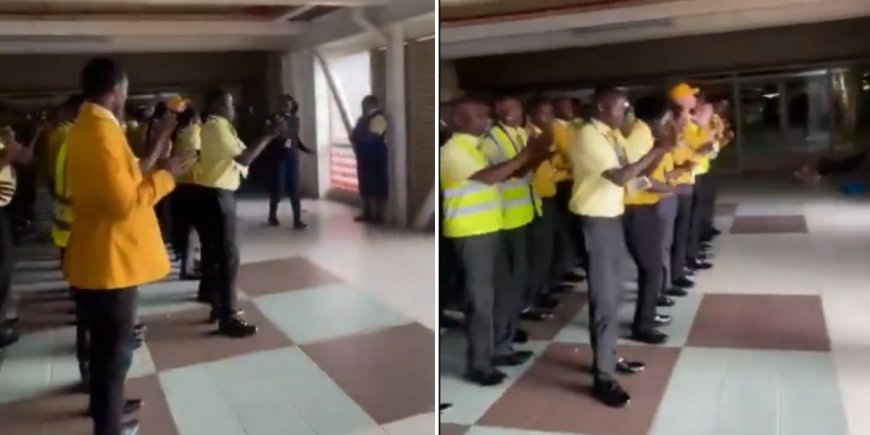Gen Z, Femicide, Adani: 4 Protests & Strikes That Defined 2024
2024 brought a new wave of protests, none that have been witnessed in Kenya's history.

Article 37 of the Constitution of Kenya is self-explanatory. For those still in the dark, it reads like this: "Every person has the right, peaceably and unarmed, to assemble, to demonstrate, to picket, and to present petitions to public authorities."
The 2023 protests ranged from anti-government protests to those supporting government policies such as the Housing Levy, and even student demonstrations. However, 2024 brought a new wave of protests, none that have been witnessed in Kenya's history.
For the first time, it was not the usual political heavyweights mobilising Kenyans to protest. 2024 saw the emergence of Gen Z in the national limelight, taking to the streets in a manner that might not be exceeded going forward...armed with nothing but the Kenyan flag, a bottle of water and cell phones with internet connectivity to stream events on social media...in real time!
Finance Bill 2024, femicide, medical, aviation...2024 was one for Kenyan history books. Viral Tea reviews the protests and strikes that made headlines in 2024:
Anti-Femicide Protests (Twice)
The year 2024 began with shocking reports of the murders of Starlet Wahu and 20-year-old Rita Waeni in the space of a week. On January 27, thousands of Kenyans gathered to protest in cities and towns in Kenya against the femicide menace, the largest event ever held in the country against sexual and gender-based violence.
In the capital, Nairobi, protesters wore T-shirts printed with the names of women who became homicide victims this month. The crowd, composed mostly of women, brought traffic to a standstill. “Stop killing us!” the demonstrators shouted as they waved signs with messages such as “There is no justification to kill women.”

Thousands protest against increasing violence against women in Kenya on January 27, 2024. /AP
The crowd in Nairobi was hostile to attempts by the Woman Representative Esther Passaris, to address them. Accusing Passaris of remaining silent during the latest wave of killings, protesters shouted her down in the middle of Jeevanjee Gardens with charged chants of “Where were you?” and “Go home!”
The protests would make a comeback on December 10 in response to resurging femicide cases between the months of August and October, with data from the National Police Service (NPS) showing that at least 97 women were brutally murdered in a period of just 90 days.
However, this brought protesters and police at loggerheads after the latter used teargas to disperse the former in the Nairobi Central Business District (CBD). A number of Kenyans and prominent activists were arrested, with human rights organizations condemning the conduct of the police on December 10.
Finance Bill Protests (June-August)
The biggest of them all this year and the result of a long-standing time bomb; proposals in the deleted Finance Bill 2024 sought to raise taxes to an all-time high, affecting every Kenyan. This was on the backdrop of President William Ruto’s promises that he would permanently transform the nation into an economic hub. This included, among many things, raising tax rates and providing a friendly environment to conduct business.
When the proposals were revealed to the public, uproar ensued and the tabling of the Bill in Parliament left Kenyans with no choice but to declare all-out war against the Bill, arguing that the taxes were intolerable to Kenyans in an already harsh economy. Warnings from insurers, aviators, farmers and even telecommunication companies indicated that the proposed tax increments would be bad for the already frail economy.
The Bill had sought to amend a number of legislations among them the Affordable Housing Act, the Industrial Training Act, the Data Protection Act, the Public Finance Management Act, and the Kenya Revenue Authority Act and threatened to impose deductions on basic commodities like bread, milk, vegetable oils and similarly affect the motor vehicle and telecommunications sectors.
The uproar turned social media into the most important tool to disseminate civic education on the detriments the Bill harboured, with activists and social media users spreading broken down details on most of the critical clauses which posed a threat to the economy. Some even created a tool based on the popular artificial intelligence (AI) chatbot ChatGPT to help Kenyans understand the unsavoury Finance Bill 2024, dubbed 'Finance Bill GPT'.
Through social media’s erudite innovations, users started sharing phone numbers belonging to President Ruto and Members of Parliament (MPs) in a bid to persuade them to shoot down the Bill during voting in Parliament.
The efforts turned futile because the Bill was still tabled before the House after a contentious public participation exercise, forcing a number of youths to take the streets to protest the unwanted proposed taxes. The protests dubbed “Occupy Parliament” kicked off on June 18 in Nairobi as the government attempted to drop a raft of controversial proposals contained in the Bill.
This however did little to calm the tempers of the protesters as they still took to the streets, arguing that the select dropped proposals merely addressed the public outcry. Despite efforts to reach Parliament being thwarted by anti-terror officers, public uproar ballooned overnight as more Kenyans ridiculed the government. Calls for the Bill’s total rejection spread across the nation as other counties took to the streets on June 20.
Meanwhile, legislators and political figures turned a blind eye to the sheer force the protests garnered as Ruto’s economic adviser David Ndii fired back at Gen Zs who staged demonstrations against the Bill 2024, calling them clueless and unable to force a revolution. “The irony of these cool kids protesting the Finance Bill they are clueless about is many are children of the plunderers who’ve bankrupted the State, the tenderpreneurs, the #KenyattaCronyCapitalismStateCapture and corruption cartels I’ve been battling since before they were born,” he said on X.
The Bill passed its second reading in Parliament despite calls from Kenyans to reject it, prompting a call to occupy Parliament on June 25, when the final voting would take place. Tensions flared towards the boiling point as protesters across the nation took to the streets and some were shot dead. President Ruto remained defiant in heeding the public’s call and maintained that the Bill would become law.
On June 25, the day Parliament was invaded, legislators made haste to pass the Bill while protesters marched on towards the House amid running battles with police officers. At around 2:30 pm, several young protesters were shot dead outside Parliament buildings as officers did not shy away from using live bullets as opposed to using teargas.
After 24 hours of public distraught, and President Ruto affirming that the protests were infiltrated by “criminals” and there was a need to deploy the Kenya Defence Forces (KDF) on the streets, he caved in and refused to sign the Bill. He vowed to engage the public in further consultations to amend the unwanted Bill. The Bill was later, on July 25, totally rejected in Parliament as MPs deleted all proposed clauses.
President Ruto later distanced himself from the deaths of the many young people killed during the protests, maintaining that “there is no blood on my hands”. Kenyan human rights commissions reported that more than 50 protesters were killed by police officers during the protests and 413 injured.
Doctors, Teachers, Lecturers Strike (March-September)
The education and health sectors have been severely affected in 2024 as delayed salaries and benefits have crippled activities in most institutions.
In August, the Kenya Medical Practitioners, Pharmacists, and Dentists Union (KMPDU) issued a warning to 11 counties over a possible strike due to delays in July and August salaries without any explanation. KMPDU Secretary General Dr Davji Atellah decried the outcome of the return-to-work formula they signed with both the county and the national government.

KMPDU Secretary General, Davji Atellah during a past press address. /PHOTO
Concurrently, a nationwide teachers' strike commenced after last-minute negotiations between the Teachers Service Commission (TSC) and the Kenya Union of Post-Primary Education Teachers (KUPPET) failed to yield a resolution. The teachers had lamented the delayed pay and unresolved grievances that had remained pending for months.
The move severely affected learners as some schools remained closed for over two weeks before the TSC revised the terms and teachers agreed to return to classes.
The crisis was however not over as university lecturers from public universities downed their tools on September 18, citing delays in finalizing the 2021-2025 Collective Bargaining Agreement (CBA) with the government.
An inter-ministerial committee was subsequently formed to address the stalemate. 18 days later, the strike was called off inking a return-to-work formula with the government, through the Ministry of Labour and Social Protection.
Moi University students and lecturers however remained in limbo as the institution’s Vice Chancellor Isaac Kosgey announced the immediate closure of the university on October 3. The cash-strapped university had been facing a series of financial challenges that led to a staff industrial action.
The University Council, however, said that it was holding consultations with key stakeholders to ensure the long-term stability of the institution. Some of the university dons have been probed by the Ethics and Anti-Corruption Commission (EACC) for allegedly embezzling billions of funds from the institution.
Airport Workers' Strike (September)
Indian conglomerate Adani Group had committed to a Ksh238 billion investment to upgrade and expand the Jomo Kenyatta International Airport (JKIA) in a deal that would see the Indian company take over the international airport for three decades. Aviation workers were NOT happy with that idea.
Despite the Kenya Airports Authority (KAA) and President Ruto denying claims that JKIA would be sold to Adani, some of the contentious proposals posed a threat to the working tenures of staffers at JKIA by favouring foreign workers over local employees.
The High Court handed the workers a big win by blocking the deal from going through as strikes were held outside JKIA after meetings by the Kenya Aviation Workers Union (KAWU). A day later, however, the workers lived up to their threats and paralysed airport operations, leaving hundreds of travellers stranded and several flights delayed.
The government would then step in with a return-to-work deal with the aviation workers to end the strike which led to normal resumption of operations at JKIA as well as at the airports in Mombasa, Kisumu and Eldoret where passengers were stranded most of Wednesday, September 11.
During the negotiations, facilitated by the Ministry of Transport and union leaders, an agreement was reached for the workers to resume duties. However, the workers were granted veto powers, allowing them to stop the controversial deal at any stage if their concerns were not addressed.
The Adani proposal was still live and with the workers threatening to resume their strikes, the Adani Group was caught up in a sensational $265m bribery claim. Adani stood accused of orchestrating a Ksh32.3 billion ($250m USD) bribery scheme and concealing it to raise money in the US.
After mounting public pressure, President Ruto severed ties with Adani on Thursday, November 21, a move that was so well-received that it sent JKIA workers into song.
Expanding JKIA is still seen as an overdue move by the government, but leasing it to Adani for a period of up to 30 years drew massive uproar, especially over the contents of the deal, some of which caused anxiety among JKIA workers who feared that the conglomerate could implement a restructuring of its workforce.







